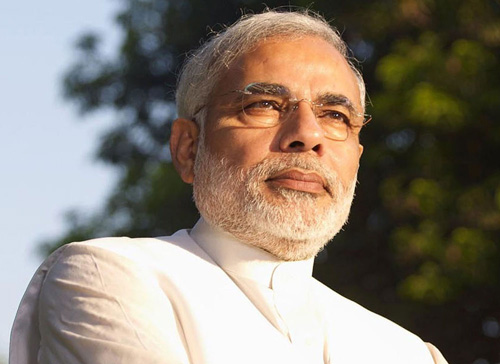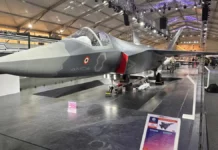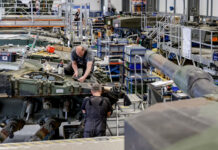“Over the last eight months we have worked hard to create that environment for you” India’s Prime Minister, Shri Narendra Modi said at the inauguration ceremony of Aero India 2015.
The new policy is not about saving on imports, but increasing the domestic market capability to support defense – by boosting investment, expanding manufacturing, support enterprise, raise the technology level and increase economic growth in India.
“In India, the defense industry in the government sector alone employs nearly 200,000 workers and thousands of engineers and scientists.” Modi said, adding that they produce an output of nearly 7 billion dollars annually. It also supports a very large pool of small and medium enterprises. “We speak in terms of national capacity, not public sector or private sector” he added.
Nevertheless, India’s defense industry in private sector is still small, it already employs thousands of people; the role of the private sector in defense is expanding, even for major platforms, but the majority of defense procurements (60%) are imported. “We are spending tens of billions of dollars on acquisitions from abroad.” Modi noted.
“We speak in terms of national capacity, not public sector or private sector”
“There are studies that show that even a 20 to 25% reduction in imports could directly create an additional 100,000 to 120,000 highly skilled jobs in India.” Modi argued, “If we could raise the percentage of domestic procurement from 40% to 70% in the next five years, we would double the output in our defense industry.” He added, “Imagine the impact in terms of jobs created directly and in the related manufacturing and services sector!”
Part of the new policy is easing the rules of foreign investments and joint ventures. “We have permitted investments up to 24% by Foreign Institutional Investments. And, there is no longer a need to have a single Indian investor with at least a 51% stake. Industrial licensing requirements have been eliminated for a number of items. Where it is needed, the process has been simplified.”
The Indian Kalyani Group and Rafael Advanced Defense Systems Ltd of Israel announced today the formation of a Joint Venture Company in India based on the new ownership model (51:49).
“We are in step with ‘Make in India’ campaign.” said Amit Kalyani, Executive Director, “The Government had recently increased the FDI cap in defense to 49%, and we hope that our proposed partnership with Rafael will be among the first few ventures under the new FDI limits.”
The initiative will enable the development and production of high-end technology systems within the country. This will include a wide range of technologies and systems, like Missile Technology, Remote Weapon Systems and Advanced Armor Solutions.
“Kalyani Group has been at the forefront in initializing the ‘Make in India’ campaign.” Baba Kalyani, Chairman & MD, said, “As part of this campaign we aim to develop and produce high end technology systems and expand the Defense Industry Base in our country. We believe in the vision of ‘Make in India’ and our proposed Joint Venture with Rafael is a step in this direction.”
“We see Kalyani Group as an ideal partner for expanding our business opportunities in India. We have supported and will continue to support the Indian Ministry of Defense in gaining technological superiority to technological excellence.” Vice Admiral (Retd), Yadida Yaari, CEO, Rafael said.
Another aspect of the Indian policy is the offsets system. According to Modi, “Offsets are a crucial instrument to develop and upgrade our defense industry. We have introduced significant reforms in our offsets policy. I am acutely aware that it still needs a lot of improvements. We will pursue them in consultation with domestic industry and our foreign partners.” Modi noted.
Modi emphasized offsets policy not as a means to export low-end products, but to acquire state-of-the art technology and skills in core areas of priority. New business awarded by the Boeing Company is examples of this new trend.
The company has recently awarded Bharat Forge contracts for titanium forging, for the supply of wing components for Next-Generation 737 and 737 MAX production lines. These multi-year contracts are part of the company’s strategy to expand global forging capacity to improve cost and reduce waste.
Bharat Forge will produce the parts at its facilities in Pune and Baramati delivering first examples in the first quarter of 2016. The titanium parts will be heat-treated, shaped in a forging press, and machined by Bharat Forge before being shipped to Boeing Portland for finish machining into components.
The contract reinforces the Boeing supply chain strategy to expand our forging supply base through partnering with high performance companies like Bharat Forge. Boeing currently has forging contracts with suppliers in Asia, Europe, Russia, and North America and will continue to add new sources of forgings around the world.
“In a competitive world where our customers are increasingly demanding more for less, this delivery is a milestone that demonstrates the capability we are scaling-up with our supply-chain partners, right here in India,” said Prat Kumar president for Boeing India.
Under a second contract with Boeing, Dynamatic Technologies has delivered the first set of aft pylon and cargo ramp assemblies for Boeing’s CH-47F Chinook helicopter.
“Our defense industry will succeed more if we can transform the manufacturing sector in India”
“We set up a new assembly line with Dynamatic Technologies soon after the Prime Minister formally launched the ‘Make in India’ program in September 2014. Going forward, our participation will continue to accelerate with support from government and our industry partners,” Kumar added.
Dynamatic’s relationship with Boeing began in 2010 with the award of a contract to supply mission and power equipment cabinets for the P-8I maritime reconnaissance and anti-submarine warfare aircraft. In 2013, Boeing placed its first H-47 Chinook helicopter contract in India with Dynamatic for aft-pylon and cargo ramp assemblies.
A third contract announced this week highlights how defense import can help increasing employment in India. It is a five-year contract worth US$28.5 million awarded by Hindustan Aeronautics Limited (HAL) to BAE Systems, for Ground Support Equipment, Spares, Support and Training for the Hawk Mk132 advanced jet trainer. The Hawk Mk132 is produced under license in India, by and the support package will enable HAL to establish a Repair & Overhaul facility for the aircraft in advance of a major servicing milestone anticipated in 2016, securing employment stability at HAL’s facilities in Bangalore.
Government’s support for research and development is essential for defense sector. And, it should also be accompanied by a degree of assurance on purchase.
Another focal point in the new policy is the support for innovation, research and development. “We are introducing a scheme to provide up to 80% of funding from the Government for development of a prototype in India. And, we are also launching a Technology Development Fund.” Modi announced. “We must develop a financing system suited to the special needs of this industry. It is a market where buyers are mainly governments, the capital investments are large and the risks are high” he added. “Our defense industry will succeed more if we can transform the manufacturing sector in India.” Modi concluded.










